To foster a new development paradigm with domestic circulation as the core and domestic and international circulations reinforcing each other, Chinese enterprises are undertaking a lead role in making better use of both domestic and international markets and resources to achieve stronger and more sustainable development and promote construction of an open world economy. Considering the new paradigm, how should Chinese enterprises further develop in the overseas markets? At the Chinese Enterprise Global Image Summit 2020 held in Beijing on November 3, representatives from government departments, business companies, think tanks, and media outlets shared strategies.
Themed “working hand in hand for common development,” the event was supervised by the Publicity Department of the CPC Central Committee, the State Council’s State-Owned Assets Supervision and Administration Commission (SASAC), and the All-China Federation of Industry and Commerce (ACFIC). It was sponsored by China International Publishing Group (CIPG), organized by China Report Press and CIPG International Cultural Center, and co-organized by the Enterprises Commission of China Public Relations Association (CPRA), with support from the Bank of China, Sinopec Corporation, China Three Gorges Corporation, China State Construction Engineering Corporation, China Communications Construction Corporation (CCCC), and China Civil Engineering Construction Corporation. The Academy of Contemporary China and World Studies (ACCWS) provided think tank support.
Guo Weimin, vice minister of the State Council Information Office and president of CPRA, addressed the opening ceremony. Peng Huagang, member of the CPC Committee of SASAC and secretary general of SASAC, Li Zhaoqian, vice chairman of ACFIC and member of the CPC Leadership Group of ACFIC, and Du Zhanyuan, president of CIPG, also spoke.
More than 300 guests including Liu Dawei, vice president of CIPG, Wu Xu, director-general of the External Promotion Bureau of the Publicity Department of the CPC Central Committee, and Chen Shi, deputy editor-in-chief of CIPG and president of China Report Press, attended the forum.
“We should make domestic circulation the mainstay with domestic and international circulations reinforcing each other, promote consumption, and expand investment space,” declared the Fifth Plenary Session of the 19th CPC Central Committee. “We should carry out opening-up to a wider range, a higher level, and in greater depth. Leveraging the advantages of our country’s big market, we should promote international cooperation for mutual benefits.” As important drivers of the country’s economy, culture, and public diplomacy, Chinese enterprises are committed to serving as channels and bridges connecting China to the world.
In his opening address, Guo Weimin noted that the sudden onslaught of COVID-19 exerted a severe impact on global economic and social development. Facing this adversity, Chinese enterprises have cooperated with partners around the world to fight the pandemic. At the same time, they are also actively contributing to international poverty reduction, the promotion of sustainable development, and fostering a community with a shared future for mankind. Multiple global issues have forced Chinese enterprises to cope with great challenges in their overseas operations for some time. With guidance from Xi Jinping Thought on Socialism with Chinese Characteristics for a New Era, China should devote more energy to “going global” and have more confidence in achieving common development. First, we should remain confident and look for opportunities in challenges. Second, we should share ideas with our partners and shape our image through cooperation. Third, we should communicate more effectively with our partners on building a community with a shared future.
Peng Huagang said in his address that in recent years, SASAC and centrally-administered state-owned enterprises (SOEs) have actively expanded their overseas presence and enhanced their operations in the international environment with cross-cultural integration. The friendly and reliable image of Chinese enterprises operating overseas is deeply rooted in the hearts of the local people, creating a fine atmosphere for their overseas operation. Since the outbreak of the pandemic, SOEs have played an important part in both pandemic prevention and control and global industrial chain stabilization. In the new circumstances of the new era, SOEs should find ways to improve their overseas image. First, they should serve the overall development of the country with more open cooperation and fully demonstrate China’s commitment to peaceful development. Second, they should uphold core values and advocate the themes of the times for a shared future. Third, they should follow the laws of communication to improve their ability to exchange information and constantly expand their international influence. Fourth, they should strengthen cultural integration by fostering the friendship between peoples of different countries to facilitate Belt and Road construction.
Li Zhaoqian said that the dire economic situation at home and abroad has forced Chinese private enterprises to bolster their confidence and enhance competence in overcoming the difficulties. They have contributed considerably to the stability in employment, finance, foreign trade, foreign investment, domestic investment, and market expectations. They have also played an important role in ensuring security in employment, basic living needs, operation of market entities, food and energy security, stable industrial and supply chains, and normal functioning of primary-level governments. Their contributions to foreign trade have helped stabilize the foreign trade market. Chinese private enterprises should remain relevant and adaptive to the changing times by examining their overseas image more closely and exploring a new path of overseas image building for more high-quality economic development. They should actively follow major national strategies and fully integrate into the new development paradigm. They should accelerate the strategic layout of the entire industrial chain and enhance their core competitiveness. And they should fulfill their corporate social responsibilities and increase their international influence.
In the current severe and complex situation, it’s even more important for Chinese enterprises to find the right path of peaceful and open development for common prosperity, according to Du Zhanyuan. He called theme “working hand in hand for common development” practically significant for the forum. To build a better image overseas, according to Du, it is necessary for Chinese enterprises to do four things: First, they should accurately grasp new trends of globalization in the post-pandemic era and actively participate in international competition and cooperation. Second, since high-quality development and strength are the core elements of corporate image, enterprises should focus more on long-term interests and long-term value of their overseas operation through product innovation and service upgrading. Third, they should conscientiously merge their own overseas image with that of the country. Fourth, they should shape their image to be positive and open.
To implement President Xi Jinping’s important instructions on publicity, SASAC and CIPG signed a strategic cooperation agreement on the sidelines of the event. The two sides will leverage their advantages to upgrade international communication capabilities and enrich the content of international communication. They will work hand in hand to present China’s SOEs to the world in the new era and enhance the international influence of Chinese culture.
Several guests delivered keynote speeches at the forum including Zu Bin, member of the CPC Leadership Group and board member of the State Power Investment Corporation (SPIC), Liu Dajun, member of the CPC Committee and general manager of the China Energy Conservation and Environmental Protection Group (CECEP), Zhang Huarong, president and CEO of Huajian Group, Chen Yubo, secretary of the CPC Committee and vice president of Tsinghua University’s School of Economics and Management.
Zu Bin stated that SPIC has achieved sovereign level credit ratings from the three major international rating agencies (Standard & Poor’s, Moody’s and Fitch) and was the first integrated Chinese energy group to manage to do so. He opined that for Chinese enterprises to build a good image overseas, they must proactively communicate with people in the host countries about what they are doing and what they can do for them. It’s also important for different Chinese enterprises operating in the same country to speak with one voice.
Liu Dajun said that green development would not be possible without international cooperation. The CECEP has continuously accelerated its pace of “going global” and vigorously explored key overseas regional markets with the group’s green industry technology advantages. In this process, the group has followed international market principles and local laws and regulations while striving to serve the economic and social development interests of host countries, which has constantly enhanced its international influence.
Zhang Huarong indicated that as a private enterprise operating in Africa, Huajian Group expects to provide 100,000 job opportunities for local people. He said his group aims to build a model enterprise for the Belt and Road Initiative, so as to make a significant contribution to building a community with a shared future for mankind.
Chen Yubo said that in the era of global connectivity, all market stakeholders are increasingly interconnected, interdependent, and interrelated. Chinese enterprises should protect and improve the long-term interests of mankind and society, and to this end, they must develop a global vision.
To scientifically and objectively evaluate the overseas image of Chinese enterprises, China Report Press, the ACCWS, and research company Kantar China released the Chinese Enterprise Global Image Survey Report (Belt and Road) during the summit. Sun Ming, vice president of the ACCWS, elaborated on the report. The summit also presented awards to the top 20 Chinese enterprises with outstanding overseas images.
The summit also released the results of the “2020 Best Practice Cases of Overseas Image of Chinese Enterprises” selection, jointly organized by China Report Press, the CIPG International Cultural Center, and the SASAC Information Center. Candidate cases included centrally-administered SOEs, locally-administered SOEs, and private enterprises. After a shortlist was published by the organizing committee and an expert panel, the list of award winners was opened for public comments before the official release. After more evaluation and discussion by experts, the top 10 best cases were determined. Awards were presented to outstanding cases in overseas pandemic containment, overseas CSR fulfillment, cross-cultural integration, overseas communication innovation, and other areas.
Some award winners including Lu Jongtao, president of China Three Gorges International, Tian Jufang, general manager of the Corporate Culture Department of the CCCC, Ji Xiaoyong, general manager of Sinohydro Corporation, Wang Meiyan, general manager of the Brand Management Department of Haier Group, and Meng Xiangchu, director of the Global Brand Communication Department of Lenovo Group, shared their experience at the summit.
According to the survey report, more than 70 percent of respondents from Belt and Road countries affirmed the positive impact of China’s economic development on the global economy, Belt and Road economies, and the economy of their own countries. The country most supportive (nearly 90%) of the positive impact of China’s economic development on Belt and Road economies and their domestic economy was Thailand.
Most respondents (45%) from the Belt and Road countries expressed interest in seeing the initiative play a bigger role in infrastructure connectivity including construction of infrastructure such as railways, sea ports and pipelines (31%) and construction of transportation networks connecting China and their own countries (30%).
About 44 percent of respondents wanted to see the initiative play a bigger role in trade facilitation including some 30 percent who expressed belief that the initiative would facilitate liberalization of trade and investment between China and their own countries and 27 percent who hoped that the initiative would create more platforms and opportunities for the enterprises from their own countries.
About 40 percent of respondents expressed interest in seeing the initiative play a bigger role in scientific innovation, including some 26 percent who preferred a scientific innovation action plan and exchange of personnel with their own countries and 27 percent who endorsed the initiative promoting construction of information and communications facilities and upgrading network connectivity in their own countries.
Respondents from all 12 countries overwhelmingly approved the performance of Chinese enterprises in providing support for their countries in coping with the pandemic. More than 60 percent of the respondents credited Chinese enterprises for abiding by pandemic prevention regulations, providing pandemic prevention supplies, and sharing pandemic containment experience. Respondents in Thailand, Malaysia, Indonesia, Saudi Arabia, Serbia, and Egypt expressed admiration for the performance of Chinese enterprises in their countries, especially in Thailand, where more than 80 percent reported a positive reaction.
The summit featured two sub-forums: one on web-based audiovisual communication on overseas images of Chinese enterprises and the other on the fulfillment of overseas CSR in the new era. It also offered a micro exhibition of Chinese enterprises’ CSR fulfillment overseas. It provided multidimensional support for Chinese enterprises to build their image overseas.
The Chinese Enterprise Global Image Summit was launched in 2013. So far, eight summits have taken place, and seven survey reports have been released. In 2015, the Chinese Enterprises Overseas Image Alliance was established. In 2019, the Chinese Enterprises International Communication Advisory Commission was established. All of these aim to enhance the reputation and influence of Chinese enterprises overseas and help build world-class Chinese enterprises with global competitiveness.
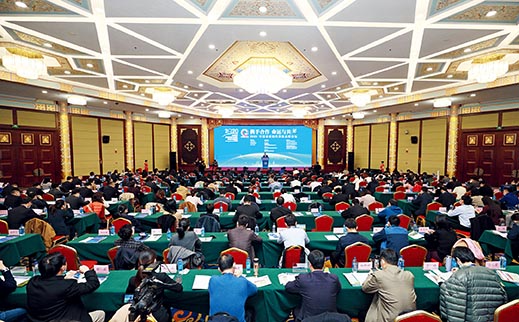
The Chinese Enterprise Global Image Summit 2020 held in Beijing on November 3. (LIU RONG)
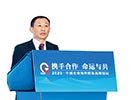
Peng Huagang MEMBER OF THE CPC COMMITTEE AND SECRETARY GENERAL OF SASAC

Guo Weimin VICE MINISTER OF THE STATE COUNCIL INFORMATION OFFICE AND PRESIDENT OF CPRA

Li Zhaoqian VICE CHAIRMAN OF ACFIC AND MEMBER OF THE CPC LEADERSHIP GROUP OF ACFIC
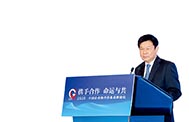
Du Zhanyuan PRESIDENT OF CIPG

Liu Dajun MEMBER OF THE CPC COMMITTEE AND GENERAL MANAGER OF CECEP

Zhang Huarong PRESIDENT AND CEO OF HUAJIAN GROUP
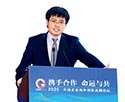
Chen Yubo SECRETARY OF THE CPC COMMITTEE AND VICE PRESIDENT OF TSINGHUA UNIVERSITY’S SCHOOL OF ECONOMICS AND MANAGEMENT

Zu Bin MEMBER OF THE CPC LEADERSHIP GROUP AND BOARD MEMBER OF SPIC
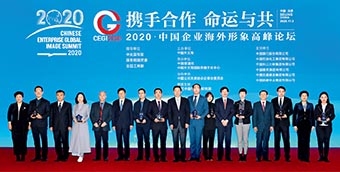
Award ceremony for Top 10 Best Practice Cases of Overseas Image of Chinese Enterprises at the Chinese Enterprise Global Image Summit 2020. (LIU RONG)
L0055.T002.JPG
Most respondents (45%) from the Belt and Road countries expressed interest in seeing the initiative play a bigger role in infrastructure connectivity including construction of infrastructure such as railways, sea ports and pipelines (31%) and construction of transportation networks connecting China and their own countries (30%).
About 44 percent of respondents wanted to see the initiative play a bigger role in trade facilitation including some 30 percent who expressed belief that the initiative would facilitate liberalization of trade and investment between China and their own countries and 27 percent who hoped that the initiative would create more platforms and opportunities for the enterprises from their own countries. About 40 percent of respondents expressed interest in seeing the initiative play a bigger role in scientific innovation, including some 26 percent who preferred a scientific innovation action plan and exchange of personnel with their own countries and 27 percent who endorsed the initiative promoting construction of information and communications facilities and upgrading network connectivity in their own countries.


 Copy Reference
Copy Reference